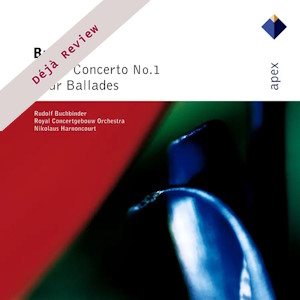
Déjà Review: this review was first published in August 2003 and the recording is still available.
Johannes Brahms (1833-1897)
Piano Concerto No.1 in D minor, Op.15 (1854-58)
Four Ballades, Op.10 (1854)
Rudolf Buchbinder (piano)
Royal Concertgebouw Orchestra/Nikolaus Harnoncourt
rec. live, October 1999, Concertgebouw, Amsterdam (concerto); 2000, Teldec Studio, Berlin
Apex 2564 603712 [76]
This disc was originally issued on Teldec as a double pack with the second concerto as coupling, and as a performance seemed to fairly and squarely divide opinion. It’s easy to see why. On first hearing, I was firmly in the camp that found the reading ponderous and uneventful, with a lack of dramatic impetus and rather four-square phrasing, despite good things along the way. As is the way with these things, familiarisation after a few more hearings has altered my judgement.
There is no doubt that Harnoncourt sets a very spacious tempo for the massive opening movement (certainly slower than the suggested dotted minim=58), putting a good two and a half minutes on Haitink/Ashkenazy’s already grand account on Decca (with the same orchestra). But I slowly began to realise that this was paying dividends in certain areas. Woodwind detail is exquisite (as at track1, 9’03) and those huge trills that permeate the movement come at you like a whirlwind. I have a suspicion that the development section is speeded up a fraction (12’03), but this is ‘live’, so the frisson created here is quite tangible. Buchbinder is a supremely intelligent artist (I have long admired his Teldec disc of late Beethoven sonatas) and his playing goes a long way towards the success of the disc. The solo cadenza at 7’54 is beautifully shaped, and the way he and the conductor handle the famous ‘wrong key’ recapitulation at 15’23 is really rather inspired, subtle rather than in neon lights.
The following movements go without much of a hitch. The lovely slow movement is allowed to breathe and unfold very naturally, and a steady but sharply etched reading of the finale gives great satisfaction. The superb Concertgebouw strings deliciously point the little fugato at 5’20, and the passage marked quasi fantasia (8’15) has exactly the right amount of just that – imaginative fantasy. The piano is beautifully caught throughout by the engineers (something that cannot be said of the Decca disc), and audience noise is remarkably low.
Competition is very fierce in this piece – I myself have six or seven performances, so maybe the very low price and addition of a coupling will sway collectors, though it has to be said that rival discs offer the same pieces. The most famous of these is undoubtedly the Gilels/Jochum DG disc, which is in a slightly higher price category and in analogue sound, but sounds well and offers supreme artistry, not least in the four lovely Ballades, which Gilels seemed to make his own. Buchbinder is every bit as sensitive to the nuances, both harmonic and atmospheric, and though he may not be quite as volatile as the Russian, his are very musical and satisfying readings. He also has superior sound quality, this time in the studio.
It may be a case here of try before you buy, but should you take the plunge (and it is, after all, less than a fiver) you can rest assured you will get musicianship of a thrilling order.
Tony Haywood
Buying this recording via a link below generates revenue for MWI and helps us keep free access to the site



















